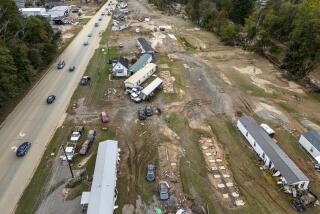9/11 and 8/29
- Share via
IF 9/11 SHOWED HOW MUCH the world had changed, then 8/29 showed how much it hadn’t. Four years ago, when terrorists crashed jets into the World Trade Center and the Pentagon, history was cleaved in half -- the era before 9/11 and after. Will 8/29, the day Hurricane Katrina made landfall along the Gulf Coast, prove to be a similar demarcation line?
The answer is complicated by the slow realization, with each anniversary, that 9/11 did not change the world (or America) as much as we thought. The response to Katrina, from both the government and the public, is the best illustration.
Both days laid bare intractable problems, but in the case of 9/11, blame for the tragedy was clear: Terrorists had attacked America. Bound by a common enemy, Democrats and Republicans enjoyed an unusual period of civility and cooperation.
No such period exists today. In part this is because the differences 9/11 glossed over are now plain; as it turns out, liberals and conservatives disagree about a lot of things, including the best way to fight a war against terrorists. In the aftermath of 8/29, unlike 9/11, the politics are more vicious because the enemy is less obvious. In other ways, 8/29 showed the government (at all levels) to be just as unprepared and incompetent -- although in new and distressing ways -- as it was before 9/11.
One of the ideas making the rounds among commentators since 8/29 is that the hurricane may lead Americans to expect more from their government, which is really the only entity that can respond to a disaster of such magnitude. If this is true, it has profound implications not just for the war in Iraq (it’s the size of the force that matters, at least as much as speed and smarts) but for domestic policy and politics.
But it is at least possible that 8/29 could have the opposite effect, causing people to give up on their government. That’s what many along the Gulf Coast did, after all, when they realized no help was forthcoming; in one case, ham-radio operators guided helicopter pilots to hospital rooftops to rescue doctors and patients. And Americans donated record amounts to charities and relief groups that were seen as more nimble and efficient than the government.
Today is the first 9/11 anniversary of the post-Katrina era. We always knew that the fight begun four years ago would be, in the president’s words, “a long struggle.” Yet he never really asked for sacrifice; to the contrary, he offered tax cuts and entreaties to “fly and enjoy America’s great destination spots.”
The impulse may have been admirable -- many Americans longed for a return to normalcy in the weeks and months after 9/11 -- but the costs were great. Americans and their government struck a deal: Neither demanded much from the other.
This year, our memories of 9/11 are filtered through the tragedy still unfolding along the Gulf Coast. The larger lessons of Hurricane Katrina have yet to be learned, partly because its full impact has yet to be felt. But maybe now we can have the debate about the role of government that we never had after 9/11.
More to Read
Sign up for Essential California
The most important California stories and recommendations in your inbox every morning.
You may occasionally receive promotional content from the Los Angeles Times.










